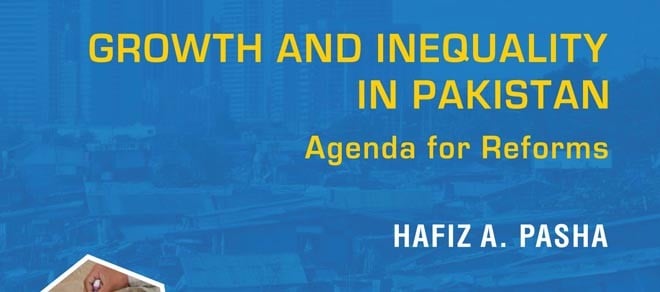
A book that presents a comprehensive reforms agenda and initiates a debate on the economic challenges posed by the internal as well as external socio-economic factors

At a time when all eyes are on the government’s economic team and their performance, books like the one under review gain an added significance. What should be the way out of the economic mess? What are the missing links in evolving a mechanism by which our economy can be turned around?
The book sets the issue of economic ills of Pakistan in proper context to help understand the fault and the decisions they require.
While inequality of income and wealth has been and is a major concern for economists, social scientists, and policy makers in Pakistan, not much has perhaps been done on the ground to actually address the issue of inequality that manifests itself in many ways and in many areas of our social fabric. Growth and Inequality in Pakistan reflects on these issues and more in a convincing manner.
While it is very instructive to look into various factors of prevalent inequalities, it is even more interesting and imperative to see the connection between inequality and economic growth in Pakistan and how to bring about reforms that directly and effectively address the problem. This is what this book chooses to address.
As the foreword of the book points out, "inequality of income or of structural nature has remained an intractable challenge and is pronounced everywhere as the scourge of our times." The problem has to be dealt with by producing a sustainable and dynamic growth and that should result in an equal distribution of wealth.
This book is the outcome of a project initiated by the Pakistan office of the Friedrich Ebert Stiftung called, the "Economy of Tomorrow (EOT)" which aims to look into shortcomings in the dominant growth models and present a comprehensive set of workable recommendations for an inclusive development model by a panel of senior experts.
Dr Hafiz A. Pasha has undertaken the much-needed task of collecting, analysing and consolidating research work of the experts and document it in the form of a book, laced with his own insight and knowledge of the issue.
Inequality of income and wealth is not just a problem faced by the Pakistani society but is a challenge for many developing countries. Unfortunately, this critical problem has not been discussed at length in our polity. And the consequences are for us to face --frustration, deprivation, poverty and terrorism. Nobody can deny the fact that persistent levels of low growth in Pakistan during the last decade and inequality not just feed on each other but become a monster that becomes increasingly difficult to control and defeat.
The book presents a comprehensive reforms agenda and will certainly work to initiate a debate on the economic challenges posed by the internal as well as external socio-economic factors and how to tackle them through policy measures and well-directed implementation.
It should be an opener for the policy makers that the rate of Pakistan’s economic growth has barely touched 5 percent over the last decade. Also, the two structural problems -- low rate of economic growth and income, wealth and regional disparities have caused massive unemployment and poverty. That explains why only inclusive growth and development policies can steer us out of the economic crisis.
The book is divided into sixteen sections, each having chapters dealing with different but connected aspects of the economy, such as population growth, the IMF programme, investment, fiscal federalism, social development, and poverty, etc. The sections contain 48 chapters.
The book takes the debate further by zeroing in on other equally important aspects of the economy, including the power sector, trade and balance of payments, taxation, and social safety nets.
The chapters have been marked by pithy and informative list of tables, charts, boxes and figures which add to the authenticity and value of the work, especially for students and researchers.
While turning the first pages of the book, one can see some chapters catch one’s attention at once, such as the one on green growth, China-Pakistan economic corridor, and fiscal federalism. The chapter on green growth takes up the very important and often neglected issue of how the process of growth can become sustainable by taking into account environmental threats and preventing harmful exploitation of natural resources.
The last section forms the crux of the book by throwing ample light on how to revive the economy, seek investment, generate employment, stabilise the balance of payments, accelerating the pace of human development, tackling poverty and improving governance, etc. This section is the logical conclusion of all that has been discussed in the book in previous chapters. The book serves as a valuable reference work for both the accomplished policy-makers as well as an inquisitive mind for economic policy.
Growth and Inequality in Pakistan Agenda for Reforms
Author: Hafiz A. Pasha
Published by Friedrich Ebert Stiftung
Pages 550